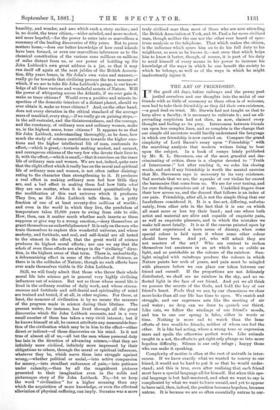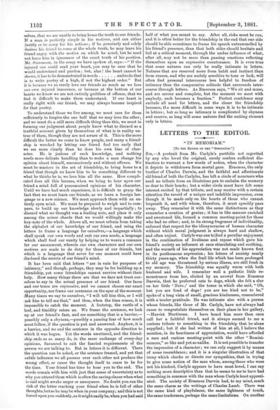THE ART OF FRIENDSHIP.
IN the good old days, before railways and the penny post jostled ourselves and our thoughts into the midst of our friends with as little of ceremony as there often is of welcome, men had to take their friendship as they did their own existence, —a good deal on trust. Mr. Darwin had not taught us that to keep alive a faculty, it is necessary to cultivate it ; and an all- pervading scepticism had not then, as now, claimed every thought and feeling as its prey. Intercourse between friends ran upon less complex lines, and so complete is the change that our simple old ancestors would hardly understand the language in which our friendship is now carried on. Compare the grand simplicity of Lord Bacon's essay upon " Friendship " with the searching analysis that modern writers bring to bear upon the subject. In a book of essays lately published by Mr. R. L. Stevenson, one of the most graceful and dis- criminating of critics, there is a chapter devoted to "Truth of Intercourse ;" but after reading it, we echo his closing words, and ask if any friendship is worth the mental exercise that Mr. Stevenson says is necessary to its very existence. Sad mortals that we are, the squeaks of our violins far exceed the harmonies that come from us. We are for ever tuning, and for ever finding ourselves out of tune. Unskilled fingers draw their bow across us, and the discord that follows is an index of our pain. Friendship, after all, is not the simple thing that our forefathers considered it. It is a fine-art, differing, unfortu. nately, from other arts in the fact that it is one on which all must more or less try their hand; and one where both artist and material are alive and capable of exquisite pain, as well as exquisite pleasure, and in which the mistakes we make tell most fatally. It is as if the canvas painted upon by an artist experienced a keen sense of dismay, when some special colour is laid upon it where some other colour should have been. And yet, who will admit they are not masters of the art ? Who are content to reckon themselves but amateurs in an art which is as subtle as light, and as perishable as the colours of the rainbow. Sun- light mingled with raindrops produce the colours in which Nature paints her arch of peace, and pain must be mingled with pleasure before we can place our token between our friend and ourself. If the proportions are not delicately distributed, we shall see no rainbow in the sky, and no re- fleeted light in the face of our friend. And yet we all think we possess the secrets of the Gods, and hold the key of our friend's heart. Fools that we are, by our clumsiness we close more locks than all our life has time to open. We snatch and struggle, and our eagerness acts like the meeting of air and water ; no drop can we draw to quench our thirst. Like cats, we follow the windings of our friend's moods, and ten to one our spring is false, either in words or time. Nothing is more sad to watch than the lame efforts of two would-be friends, neither of whom can feel the other. It is like bad acting, where a wrong tone or expression mars and spoils the otherwise perfect words. Like animals caught in a net, the efforts to get right only plunge us into more hopeless difficulty. Silence is our only refuge ; happy those who can make it speaking.
Complexity of motive is often at the root of untruth in inter- course. If we knew exactly what we wanted to convey to our friend, it would not be hard to pat it so that he would under- stand ; and this is true, even after realising that each friend must have a special language all for himself. But when this spe- cial language is but half-mastered, and what we want to say is complicated by what we want to leave unsaid, and yet to appear to have said, then, indeed, the position becomes hopeless, because untrue. It is because we are so often essentially untrue to oar- -selves, that we are unable to bring home the truth to our friends. If a man is perfectly simple in his motives, and can either justify or be sorry for his actions ; if he genuinely and solely .desires his friend to come at the whole truth, he may leave his friend angry with the motive on which he acted, but he need not leave him in ignorance of the exact truth of his position. Mr. Stevenson, in the essay we have spoken of, says :—" If the 'injured one could read your heart, you may be sure that he -would understand and pardon ; but, alas ! the heart cannot be shown, it has to be demonstrated in words and to do that is to write poetry of a high, if not the highest order." But it is because we so rarely love our friends as much as we love our own injured innocence, or because at the bottom of our 'hearts we know we are not entirely guiltless of offence, that we find it difficult to make them understand. If our heart is really right with our friend, we may always become inspired for that poetry.
To understand those we live among, we must care for them sufficiently to forgive the one half that we may love the other; and we must do a still more difficult thing than this, we must in forming our judgment about people know what to discard as a truthful account given by themselves of what is in reality un- true of them, though they are not aware of it. This is the more difficult the better we come to know people, and many a friend- ship is wrecked by letting our friend feel too early that we see more clearly than he does his own bias of char- acter. He is jealous of such knowledge, and nothing needs more delicate handling than to make a man change his opinion about himself, unconsciously and without offence. We must be masters in the art of friendship, to bring home to a friend that though we know him to be something different to what he thinks he is, we love him all the same. How compli- ,cated does all this become, when we bring to bear upon our friend a mind full of preconceived opinions of his character. Until we have had much experience, it is difficult to grasp the fact that we must learn our friends, as we learn a foreign lan- guage or a new science. We must approach them with an en- tirely open mind. We must be prepared to weigh and to com- pare, to build up our knowledge slowly and impartially ; to discard what we thought was a leading note, and place it only among the minor chords that we would willingly make the -key-note of the whole. Above all, we must refrain from taking the alphabet of our knowledge of our friend, and using the letters to frame a language for ourselves,—a language which shall speak our own words and suit our own needs, a language which shall feed our vanity by helping us to weave a romance for our amusement, wherein our own characters and our own motives are made to do duty for those of our friends, but which is a language that never for one moment could have disclosed the secrets of our friend's mind.
It has been said that letters "are in vain for purposes of -intimacy," and though, perhaps, they may be for building up a friendship, yet some friendships cannot survive without their help. How many things there are that we dare not trust our- -selves to say in the actual presence of our friend. Our faces and our tones are expressive, and we cannot choose our exact opportunity, nor frame our sentences on the spur of the moment. Many times we say to ourselves, "I will tell him this, or I will .ask him to tell me that," and then, when the time comes, it is impossible to catch the moment. A footstep, the rustle of a leaf, and timidity seizes us. We frame the sentence, we look up at our friend's face, and see something that is a barrier,— possibly only a shyness,—possibly a passing fear of how much must follow, if the question is put and answered. Anyhow, it is a barrier, and we end the sentence in the opposite direction to which it was begun. Yet the words unuttered, and the friend- ship ends as so many do, in the mere exchange of every-day opinions, flavoured to suit the fancied requirements of the person we are talking to. But in letters it is different. There the question can be asked, or the sentence framed, and yet that subtle influence we all possess over each other not produce the wrong effect, or cause the thought itself to cease to be for the time. Your friend has time to hear you to the end. The words remain with him with just that sense of uncertainty as to why you uttered them which is often the saving clause when what is said might awake anger or annoyance. No doubt you run the risk of the letter reaching your friend when he is full of other thoughts, but so he may be when in your company; and this is not forced upon you suddenly, as it might easily be, when you had said half of what you meant to say. After all, risks must be run, and it is often better for the friendship in the end that one side should be able sometimes to frame his speech untrammelled by his friend's presence, than that both sides should hesitate and fail at a critical moment, through the undue influence of what, after all, may not be more than passing emotions reflecting themselves upon an expressive countenance. It is even true that some natures can only be really intimate in letters. Natures that are reserved more from habit and instinct than from reason, and who are unduly sensitive to tone or look, will often find personal intercourse less helpful to freedom of intimacy than the comparative solitude that surrounds inter- course through letters. As Emerson says, "We sit and muse, and are serene and complete, but the moment we meet with anybody, each becomes a fraction." Perfect confidence may exclude all need for letters, and the closer the friendship becomes, the more difficult in some ways it is to be intimate in letters; but so long as intimacy is complicated by shyness and reserve, so long will some natures find the uniting element only in letters.



































 Previous page
Previous page